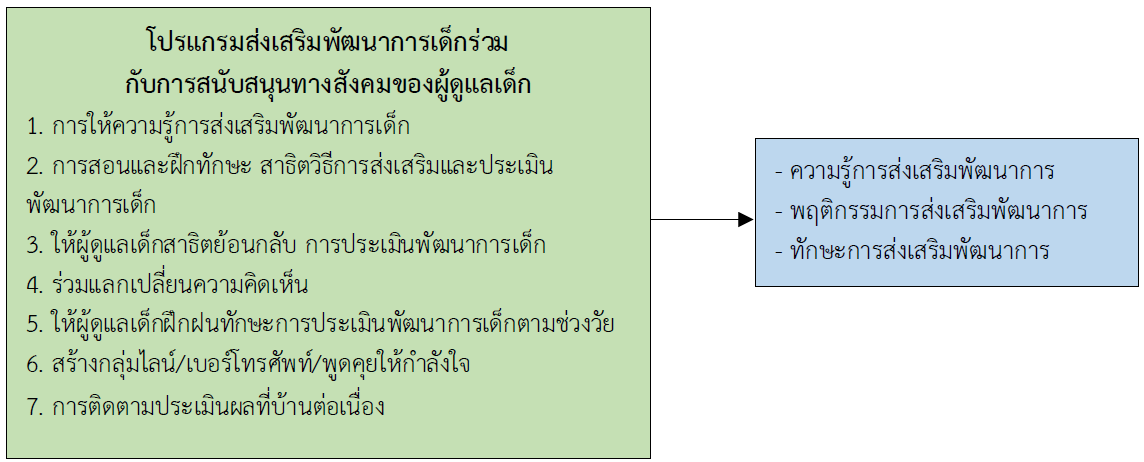ผลของโปรแกรมการส่งเสริมพัฒนาการเด็กก่อนวัยเรียนร่วมกับการสนับสนุนทางสังคม ต่อความรู้ พฤติกรรม และทักษะการส่งเสริมพัฒนาการของผู้ดูแลเด็ก ในตำบลชัยบุรี อำเภอเมืองพัทลุง จังหวัดพัทลุง
คำสำคัญ:
การส่งเสริมพัฒนาการ , การสนับสนุนทางสังคม, ความรู้และพฤติกรรม, โปรแกรม, เด็กวัยก่อนเรียนบทคัดย่อ
การวิจัยกึ่งทดลองแบบกลุ่มเดียววัดก่อนและหลังการทดลอง มีวัตถุประสงค์เพื่อศึกษาประสิทธิผลของโปรแกรมการส่งเสริมพัฒนาการเด็กก่อนวัยเรียนร่วมกับการสนับสนุนทางสังคมของผู้ดูแลเด็กในตำบลชัยบุรี อำเภอเมืองพัทลุง จังหวัดพัทลุง กลุ่มตัวอย่าง คือ ผู้ดูแลเด็กที่มีบุตรหลานในช่วงอายุ 2 - 5 ปี จำนวน 44 คน ใช้วิธีจับฉลากอย่างง่ายแบบไม่คืนที่ เครื่องมือที่ใช้ในการเก็บรวบรวมข้อมูล คือ โปรแกรมส่งเสริมพัฒนาการเด็ก แบบสอบถามความรู้ พฤติกรรม และแบบบันทึกประเมินทักษะการส่งเสริมพัฒนาการเด็กก่อนวัยเรียนของผู้ดูแล โดยผ่านการตรวจสอบความตรงตามเนื้อหาจากผู้ทรงคุณวุฒิ จำนวน 3 คน ได้ค่าดัชนีความตรงเท่ากับ 0.87 และผ่านการตรวจสอบความเที่ยงของเครื่องมือ แบบสอบถามความรู้เกี่ยวกับการส่งเสริมพัฒนาการเด็ก พฤติกรรมการส่งเสริมพัฒนาการเด็ก ได้ค่าสัมประสิทธิ์ความเที่ยงเท่ากับ .82 และ .87 ตามลำดับ วิเคราะห์ข้อมูลโดยสถิติ เชิงพรรณนา การแจกแจงความถี่ ร้อยละ ค่าเฉลี่ย และส่วนเบี่ยงเบนมาตรฐาน และสถิติทดสอบ Paired t-test ผลการวิจัย พบว่า
หลังสิ้นสุดโปรแกรม ค่าเฉลี่ยความรู้ พฤติกรรม และทักษะของกลุ่มตัวอย่างสูงกว่าก่อนเข้าร่วมโปรแกรมอย่างมีนัยสำคัญทางสถิติตามลำดับ (t = 6.14, p-value < .001) (t = 9.43, p-value < .001) (t = 6.39, p-value < .001)
โปรแกรมการส่งเสริมพัฒนาการเด็กก่อนวัยเรียนร่วมกับการสนับสนุนทางสังคมทำให้ผู้ดูแลเด็กมีความรู้ พฤติกรรม และทักษะในการส่งเสริมพัฒนาการเด็กก่อนวัยเรียนสูงขึ้นหลังการทดลอง ดังนั้นบุคลากรสาธารณสุขควรใช้เป็นแนวทางในการส่งเสริมผู้ดูแลเด็ก โดยแนะนำการใช้คู่มือเฝ้าระวังและส่งเสริมพัฒนาการเด็กปฐมวัย (DSPM) และร่วมสนับสนุน ติดตามวางแผน ดูแลอย่างต่อเนื่องให้มากยิ่งขึ้น ทั้งที่ในสถานบริการและในชุมชน
เอกสารอ้างอิง
Black, M., Walker, P., Fernald, H., Andersen, T., DiGirolamo, M., Lu, C., et al. (2017). Early Childhood Development Coming of Age: Science through the Life Course. The Lancet, 389,77-90. doi:10.1016/s0140-6736(16)31389-7.
Chung, O., Fernald, H., Galasso, E., Ratsifandrihamanana, L. & Weber, M. (2019) Caregiver perceptions of child development in rural Madagascar: a crosssectional study. BioMed Central Public Health, 19(1256), 1-12.
Faul, F., Erdfelder, E., Lang, A.-G., & Buchner, A. (2007). G*Power 3: A flexible statistical power analysis program for the social, behavioral, and biomedical sciences. Behavior Research Methods, 39, 175-191.
House, J. S. (1981). Work stress and social support. Rading Mass: Addison –Wesley.
Ketren, P. (2020). Health literacy situation of child rearing among preschoolers of primary caregiver: 4 case study. Journal of Health Promotion and Environment, 43(2), 45-58. (in Thai)
Kue-iad, N., Chaimay, B., & Woradet, S. (2018). Early Childhood Development among Thai Children Aged Under 5 Years: A Literature Review. The Southern College Network Journal of Nursing and Public Health. 5(1), 281-296. (in Thai)
Ministry of Public Health, Department of Mental Health. (2020). The Effect of Coaching Surveillance Skills and Promoting Child Development of Postpartum Mothers or Primary Caregivers in Thailand. Nonthaburi: Ministry of Public Health.
Ministry of Public Health, Department of Mental Health. (2015). Annual Report of the Department of Mental Health, 2015. Division of Planning, Department of Mental Health. Nonthaburi: Ministry of Public Health. (in Thai)
Ministry of Public Health, Department of Mental Health. (2015). Development and Promotion of Early Childhood Development. Chiang Mai: Rajanagarindra Institute of Child Development. (in Thai)
National Statistical Office of Thailand. 2023. Thailand Multiple Indicator Cluster Survey 2022, Survey Findings Report. Bangkok: National Statistical Office of Thailand.
Neocleous. M., Hepworth K., Cavallera. V., & Gladstone. M. (2023). Training packages for the use of child development tools in low/middle-income countries: a review. Archives of Disease in Childhood, 108, 103–107. doi:10.1136/archdischild-2022-323814
Papakang, S. (2022). The Roles of Parents in child development assessment according to the DSPM Manual. Mahasarakham Hospital Journal. 19(2). 176-185. (in Thai)
Suwatanasawat, W., Siriphan, K., & Srimahunt, K. (2020). The Developmental Promotion Using the LearningActivities Program: Preschool Development Center, Boromarajonani College of Nursing, Ratchaburi. Journal of Prachomklao College of Nursing, Phetchaburi Province, 3(2), 121-132. (in Thai)
Urharmnuay, M., Intharangkun Na Ayutthaya, A., Thipsungwan, K., Boongla, P., Kummee, S., & Narkrow, K. (2021). The Effects of Early Childhood Development Promotion Program on knowledge and Promotion Behaviors on Child Development of Parents and Caregivers in Mueang District, Lampang Province. APHEIT Journal of Nursing and Health, 3(1), 48-63. (in Thai)

ดาวน์โหลด
เผยแพร่แล้ว
ฉบับ
ประเภทบทความ
สัญญาอนุญาต
ลิขสิทธิ์ (c) 2024 วารสารเครือข่ายวิทยาลัยพยาบาลและการสาธารณสุขภาคใต้

อนุญาตภายใต้เงื่อนไข Creative Commons Attribution-NonCommercial-NoDerivatives 4.0 International License.
1. บทความหรือข้อคิดเห็นใด ๆ ที่ปรากฏในวารสารเครือข่าย วิทยาลัยพยาบาลและการสาธารณสุขภาคใต้ ที่เป็นวรรณกรรมของผู้เขียน บรรณาธิการหรือเครือข่ายวิทยาลัยพยาบาลและวิทยาลัยการสาธารณสุขภาคใต้ ไม่จำเป็นต้องเห็นด้วย
2. บทความที่ได้รับการตีพิมพ์ถือเป็นลิขสิทธิ์ของ วารสารเครือข่ายวิทยาลัยพยาบาลและการสาธารณสุขภาคใต้







